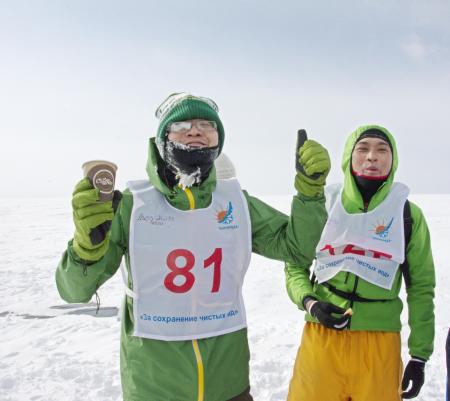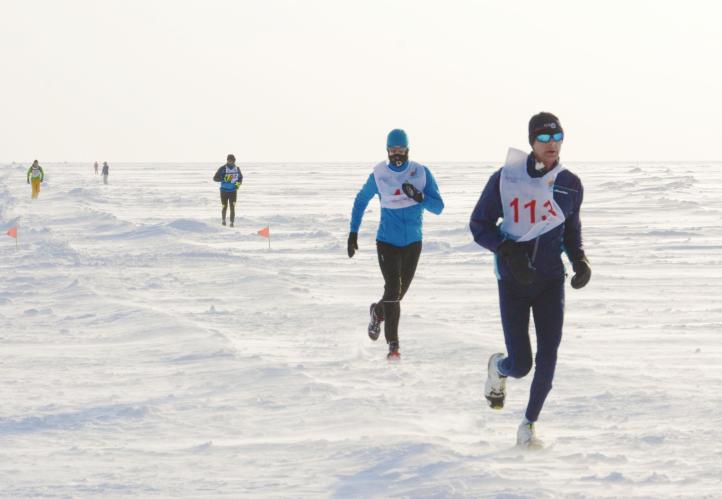KYODO NEWS

FEATURE: Unique challenges attract runners to Baikal Ice Marathon
27 April 2016
SPORTS
The international ice marathon on Lake Baikal has attracted a growing number of participants since it was established a decade ago and about 200 runners, including 11 Japanese, challenged one of the world's toughest endurance races this year.

The Baikal Ice Marathon is "mentally harder than running through a desert," Kyo Satani, a 41-year-old runner from Tokyo said, comparing the event with the Sahara Marathon in Africa in which he participated last year.
"You cannot figure out how far you have run" because of the monotonous frozen scenery of the lake, Satani said. The restaurant owner ran the 42.195 kilometer distance across the world's oldest and deepest freshwater lake in Siberia on March 6.
While many runners wear goggles to protect their eyes from sunlight reflected off the ice and snow, they still have an almost psychedelic experience when running on what appears to be a mirror-like lake surface when the sky is blue and the sun is shining.
Competitors in the full marathon run from the southern shore of the lake to Listvyanka, a popular tourist spot on the west side.

In the race, runners wear shoes equipped with special spiked soles that provide grip on the lake's snow and ice surface.
Temperatures normally sit at around 17 degrees Celsius below zero but runners can feel much colder when battling against winds that have whipped across the lake surface. As if that is not challenge enough, runners who overdress in winter gear may be too hot, so they need to adapt their race strategy as conditions change.
A polish man, Piotr Hercog, won this year's race in 3:55:51, approximately an hour slower than the course record. He led home the 200 entrants in 2016, but when the race was first held in 2005 it was contested by just 25 people.
Toyohiko Tachibana, one of the 11 Japanese runners, participated in the event for the fourth time and finished in more than seven hours as he had to fight his way through difficult conditions.
"The lake is attractive because it looks different every year, depending on weather conditions," Tachibana, a 48-year-old businessman in Moscow, said. "I will come here next year again."
Alexei Nikiforov, the race director, said he also wants participants to raise awareness about the protection of Lake Baikal, also one of the most biologically diverse lakes in the world. The lake, which is located in southeast Russia with its southern tip near the Mongolian border, faces a severe threat from water pollution.
Elsewhere, a running event on frozen seawater off Vladivostok in the Russian Far East was held in February for the first time.
Satoshi Omuro, 38, a branch manager of a Japanese travel agency who ran the half-marathon race on Lake Baikal, was among some 400 participants in the Vladivostok event. He ran a 10-km distance.
The race "was hard, but may attract more tourists if combined with attractions such as a ride aboard a hovercraft," Omuro said.
==Kyodo
